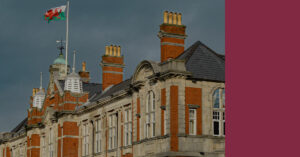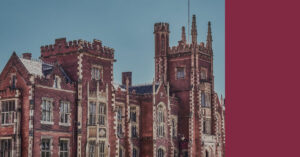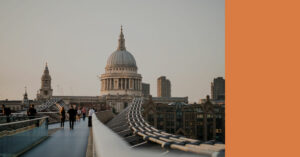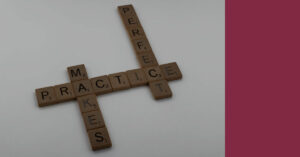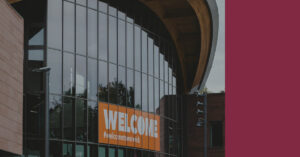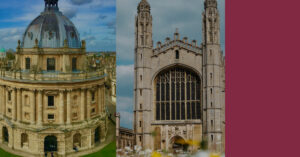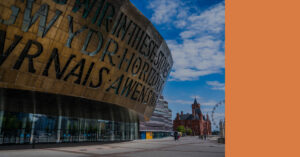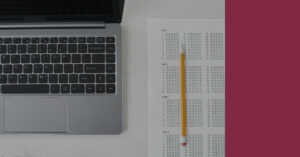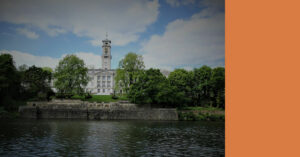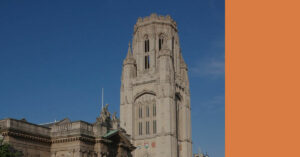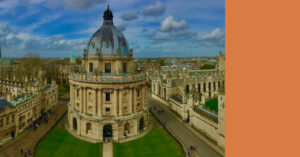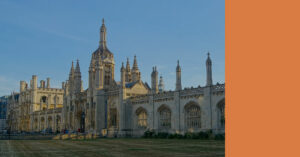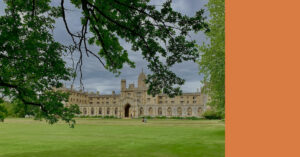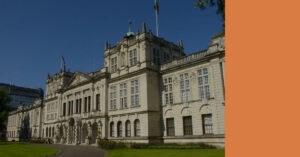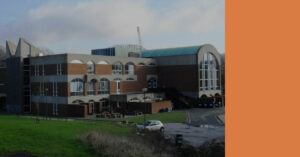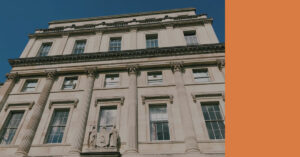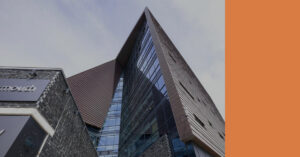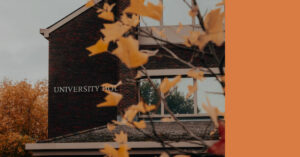Welcome to our UK Medical School Review series. In this series, we work with current students to produce an in-depth overview of each UK Medical School, covering what it is like to study there, how the course looks and what you need to get in.
Today, we are focussing on Dundee Medical School, a research-intensive University in Scotland. Miranda, a Dundee Medic, will share her experiences and insights as a current student throughout.
Overview Of Dundee Medical School
About Dundee Medical School History
Medical teaching at the University College Dundee began when it was founded in 1881. The college was unable to award degrees and consequently merged with the University of St. Andrews in 1887, with formal union occurring in 1897. Buildings for Dundee Medical School opened in 1904, initially accommodating 100-150 students. Eventually, a University Charter was awarded in 1967 and the University of Dundee Medical School became independent to St. Andrews. Nowadays, there are 1,009 and 2,645 undergraduate and postgraduate students enrolled at the School of Medicine in Dundee.
Dundee Medical School offer 2 Undergraduate Medicine programmes: a standard 5-year course and a Gateway to Medicine 1-year course, that upon completion leads to enrolment in the 5-year Undergraduate course. Both culminate in the award of a Bachelor of Medicine, Bachelor of Surgery (MBChB) degree. There are no Graduate Medicine courses offered at Dundee. A 5-year Undergraduate course is offered for Dentistry.
Dundee Medical School

- University Age: 141
- UK Ranking: 8th
- Pint Price: £3.50
- Alumni Notability: 10/10
- A-level Requirements: AAA
- Places Available: 160
- Applicant Success Rate: 11%
- Teaching Style: Integrated
- Interview Style: Panel
- Admissions Test: UCAT
Dundee Medical School Alumni
Among Dundee Medical School’s notable alumni are: Sir James W. Black, Pharmacologist and Nobel Laureate; Narendra Patel, Baron Patel, Obstetrician and former Chancellor of the University, and Dr William Alexander Young, Surgeon and Epidemiologist who studied and treated many tropical diseases in West Africa, particularly yellow fever.
Why did you choose to study at Dundee?
“I was keen to train in Scotland, try somewhere that was far away from home and a challenge for me personally. I also really liked the systems-based curriculum, where you learned anatomy, physiology and normal function of organs, before going into pharmacology and pathophysiology. I also enjoyed that the final 2 years where practically focused, and especially Year 5 was designed to prepare us to function as Foundation Doctors in the NHS.”
What is the best thing and worst thing about Dundee Medical School?
“Best thing – how friendly everyone is, very sociable, good sized years. Worst thing – you are definitely taught early on to be responsible for yourself, which although important, it can be isolating if you are struggling. This is improving compared to when I was a student!”
Medical School Rankings
The following link will take you to the Complete University Guide Medicine League Table. University of Dundee Medical School takes 8th position with an overall score of 97%:
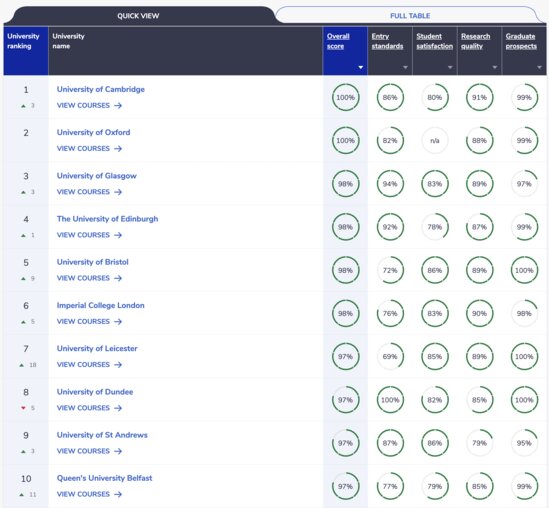
The table also highlights 100% entry standards and graduate prospects for Dundee Medics so there’s little to worry about once you graduate!
Rankings will, of course, differ between other tables; the Guardian includes different aspects to the Complete University Guide. When making your own decision on which table to look at, think about what you place more importance on, such as spending per student or career prospects. Keep in mind that all Medical Schools are highly ranked with excellent ratings across the board.
Dundee Medical School Fees And Financial Support
Annual tuition fees for Scottish citizens are £1,820. For those from England, Wales, Northern Ireland and Republic of Ireland they are £9,250. International students’ annual tuition costs are £50,100. Scottish students can apply to the Students Award Agency for Scotland (SAAS) to be assessed if they are eligible to have their fees paid by the Scottish Government.
Tuition fee loans are offered to all other UK students by the Government and cover the course fees in full. Fees do not have to be paid up front. Dundee offer several scholarships for Scottish, other UK and international students who may need help with costs. There is also plenty of support for students by the University team.
What are the living costs like?
“Average rent – £350 per month (based on sharing a house). Public transport – a student ticket for the bus to the hospital is approximately £10 per week. The hospital is easily accessible by foot, bike or car. Pint – £3-4 depending on quality of pint, location and time of week.”
Not sure where to start with your Medical School application?
Our Complete Bundle provides support for your Personal Statement, UCAT, BMAT and Interview and guides you to a successful application.
With our Complete Bundle, we guarantee that you will get at least one offer to study Medicine, or your money back.
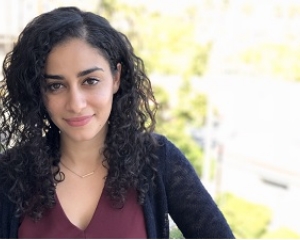

What Is Studying At Dundee Medical School Like?
The first 3 years at Dundee Medical School focus on the theory behind Medicine and how it applies clinically. Students will learn about each body system, what is normal and abnormal, through lectures, clinical cases, team-based activities, simulation and anatomy using cadaveric dissection.
The cadavers used at Dundee are Thiel-embalmed and therefore retain real life-like tissue quality helping to examine anatomy that is as close to the living person as possible, something no other UK Medical School offers.
Students do also undertake some clinical placements in these years, mainly based at Ninewells Hospital, however there are opportunities to undertake placements in primary and secondary care settings in other areas of Scotland.
Years 4 and 5 are the clinical years where students fully delve into placements and put what they have learnt into practice. Students undertake longer-term placements for several weeks in a range of fields to gain a broad experience of healthcare. These can often take place away from Dundee.
What is a week in first year like at Dundee Medical School?
“Monday – AM 3 1x hour lectures, PM 2 hour seminar. Tuesday – AM Dissection, PM 2 hour seminar. Wednesday – AM 3 1 x hour lectures, PM Sports Afternoon. Thursday – AM 2 1 x hour lectures, 1 x 2 hour seminar, PM GP Session (involving short cases and small group sessions with a GP in their practice). Friday – AM 3 x 1 hour lectures, PM Clinical Skills Seminar (involving clinical cases, problem of the week, pharmacology workshops, prescribing workshops and microbiology labs).”
Dundee Medical School Degree Content
Dundee offers one undergraduate Medicine course. There is also a one year Gateway to Medicine course for those from disadvantaged backgrounds, and also a Dentistry course.
Undergraduate Medicine Course
Each year at Dundee Medical School are referred to as Levels. Level 1 starts with a Foundation block, following which teaching is modular and spiralling in nature – what you learn will be built on in later years
At least 1 Student-Selected Component (SCC) is undertaken during each year of study. These are self-directed opportunities to learn and experience fields of unique interest and build a wider skillset. Examples include: in-depth study of clinical specialities, creating learning aids and art-based modules covering Medicine.
After Year 3 there is the option to intercalate for a Bachelor of Medical Sciences (BMSc) degree. This can be completed either in Dundee or elsewhere, and is recommended to be in a field of interest for you.
Level 4 starts out with a transition block to help students learn how to get the most out of your ward-based learning. This lasts the first 8 weeks.
During Level 4 there is the optional opportunity to work in a parallel curriculum and spend a year working in a partnering NHS practice, in what is referred to as the Dundee Longitudinal Integrated Clerkship (DLIC). You will be able to learn from real-life experiences and follow specific patients on their healthcare journey, personally reflecting throughout.
Students can undertake an 8-week Elective during Year 5 which can be either in the UK or overseas.
To complete the degree and prepare students for entering their Foundation Years as a Doctor, students also conduct an Apprenticeship in Final Year.
Summary of the curriculum:
Year 1: Level 1
- Foundation block (first 8 weeks):
- Structural Principles
- Functional Principles
- Molecular Principles
- Psychosocial Principles
- Disease Mechanisms
- Defence Mechanisms
- Principles of Drug Therapy
- Safe Medical Practice
- System blocks:
- Respiratory
- Reproduction
- Cardiovascular
- Infection and immunity
- SSC
Year 2: Level 2
- System blocks:
- Renal
- Gastrointestinal
- Nervous
- Musculoskeletal
- Ageing
- Endocrine
- Haematological
Year 3: Level 3
- System blocks:
- Child and family
- Special Senses: ENT
- Ophthalmology
- Dermatology
- SSC
Years 4 and 5: Levels 4 and 5
- Transition block
- Clinical attachments (8 weeks each):
- General Medicine (4 weeks), Infectious diseases (1 week), Neurology (2 week), Oncology (1 week)
- General Surgery (4 weeks), Ophthalmology (1.5 weeks), Otolaryngology (1.5 weeks), Urology (1 week)
- Anaesthetics (1 week), Emergency Department (1 week), Orthopaedics (1 week), Rheumatology (1 week), Ageing & Health (2 weeks), Dermatology (2 weeks)
- General Practice (4 weeks), Psychiatry (4 weeks)
- Child Health (4 weeks), Obstetrics & Gynaecology (4 weeks)
- Preparation for practice:
- Acute care block
- Elective
- Foundation apprenticeships
- SSC
The other Medical Course is the Graduate Course.
This Gateway to Medicine programme allows students from disadvantaged background and those who achieved lower grades than required due to hardship, a chance to study Medicine. The year will be tailored to each student’s personal academic needs, for example if you feel you are short of Chemistry, Maths or Physics then you can choose any of these to study in Semester 1.
Once you have found the right science subjects to help you progress then the rest of the timetable can be completed with these. Psychology, anatomy and modules covering key healthcare themes, such as healthcare provision in the UK, are also on offer.
Teaching will be delivered via lectures, workshops, practical classes, tutorials, team-based activities and shadowing placements.
Upon successful completion of the year, students join those students beginning their Year 1 in the standard Undergraduate 5-year course.
Dentistry at Dundee Medical School is offered as a 5-year course. The course prepares students for a future career in Dentistry by teaching them the fundamentals of the sciences that underpin Dentistry and allowing them to put skills to practice in clinical environments during placements.
Unique to Dundee is the study of anatomy using Thiel-embalmed cadavers, the opportunity to take part in research projects through summer internships and through the Dental Wiki project, and the chance to explore topics of your choice in the annual Discovery Week, building on this with your Elective study. Teaching is delivered via lectures, tutorials, practical laboratory sessions, workshops, clinical skills classes and placements.
What Makes Dundee Medical School Unique?
What makes your Medical School unique?
“I think the emphasis on being good clinical doctors with good clinical judgement from the early stages of training makes Dundee graduates uniquely able to adapt to post-graduate life. There are a variety of teaching methods common to other Medical Schools – dissection, simulation, ward-based teaching, GP placements. I would also say the exposure to healthcare in a variety of locations is quite special, with placements ranging from Perth and the Highlands, to Orkney and Dumfries. The location of Dundee on the River Tay and the easy travel to sea, shore and hills is perfect for exploring Scotland and taking some much needed time away from Medicine.”
Candidate Selection
Stage 1: applicants pre-screened against academic criteria.
Stage 2: score given for UCAT result and academic achievements.
Stage 3: UCAT score and academic score combined (40:60) and ranked to determine who is to be invited for interview.
Stage 4: applicants attend interview.
Stage 5: scores from interview compiled, ranked and offers made.
Dundee Medical School Entry Requirements
| Exam | Undergraduate Medicine |
|---|---|
| GCSES | Biology, English and Mathematics at least grade B/6 |
| A-Levels | AAA including Chemistry and 1 other science (Biology, Physics or Mathematics) |
| IB | Overall score of 37 points, with at least 6, 6, 6 at Higher Level, including Chemistry and 1 other science (Biology, Physics or Mathematics) |
| Other qualifications | Scottish Highers/Advanced Highers |
| Exam | Undergraduate Medicine |
|---|---|
| GCSES | Biology, English and Mathematics at least grade B/6 |
| A-Levels | BBC including Chemistry and 1 other science |
| IB | Overall score of 37 points, with at least 6, 6, 6 at Higher Level |
| Other qualifications | Scottish Highers/Advanced Highers |
| Exam | Undergraduate Medicine |
|---|---|
| GCSES | Biology and Chemistry at least grade A/7, English and Mathematics and another subject at least grade B/6 |
| A-Levels | AAA including Chemistry and Biology |
| IB | Overall score of 37 points, with at least 6, 6, 6 at Higher Level |
| Other qualifications | Scottish Highers/Advanced Highers |
Medical School application causing you confusion?
Our Complete Bundle provides support for your Personal Statement, UCAT, BMAT and Interview and guides you to a successful application.
With our Complete Bundle, we guarantee that you will get at least one offer to study Medicine, or your money back.
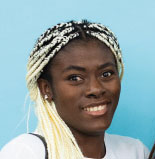

Dundee Medical School Personal Statement
Your personal statement will not be graded or scored in the application process to Dundee Medical School however it can be used as a starting point for formulating answers to questions in the interview.
Dundee Medical School want you to demonstrate your suitability and motivation for the course. Why Dundee?
It is favourable that students undertake some relevant work experience to show you have some insight into the role of a Doctor. This doesn’t necessarily have to be medically-related in primary or secondary care settings as it is appreciated this can be difficult. Hands-on caring experience and other volunteering could be just as appealing. It’s important you reflect on what you did and what you learnt from it that makes you the right fit for a Doctor.
It is also important that you show you are more than just Medicine. Expand on your hobbies and interests, particularly on how they have given you skills of communication, empathy, teamwork and motivation. The most important thing is to remember to be candid and know it inside out as you can always be asked to draw on these points in your interview!
When it comes to personal statement writing, 6med’s Personal Statement Bundle is your best bet for creating the perfect statement!
Dundee Medical School Admissions Tests
UCAT Requirements
You need to undertake the University Clinical Aptitude Test (UCAT) in order to apply for the University of Dundee. There is no minimum cut-off score, however a higher score is advantageous as those with a higher UCAT decile, along with a higher academic score, will be invited for interview. UCAT score is weighted 40%, whilst academic score is weighted 60%. For reference, the lowest UCAT score to be invited for an interview in 2022 was 2270.
Over the last few years, the top and bottom UCAT scores for applicants that receive offers for interviews are 3280 and 2300. Check out our UCAT Scoring Guide to learn more!
The BMAT is not required.
Dundee Medical School Interview
Approximately, 550 students are invited for interview, roughly 3 times that of the available places. Interviews at Dundee typically take place between December and January.
Panel Interview Style
The interview currently takes the form of a panel interview. Interviewers are typically staff and students from the Medical School.
During the interview, applicants will discuss 5 scenarios each lasting 6 minutes. There will be a 1 minute break between each to read briefing material before answering questions.
The interview is designed to assess communication, critical thinking, personal values, teamwork, motivation to Medicine and what you have learnt and gained from your work experience. They are looking for caring and hardworking individuals.
If you’re feeling unsure about your interview skills, you can sign up for 6med’s Interview Bundle to learn everything you need to know to ace your interviews!
Example Dundee Medical School Interview Questions:
- If you could choose to allocate an additional £20 million to either of the following areas of healthcare, which one would you choose and why: cancer research, mental health, Covid-19 research, palliative care, prolonging life research (2020)
- What is the system in place for organ donation in Scotland? (2019)
- What do you think makes a good team member and how do these attributes differ from those of a good team leader? (2018)
- Has anyone ever tried to dissuade you from applying to Medicine? What convinced you to do otherwise? (2021)
- Why would you like to study Medicine at Dundee? (2019)
- A fellow medical student has been involved in a drunken altercation overnight and turns up to a lecture hungover the next day. Decide the best course of action. (2020)
- Instruct a child on how to build a lego model. (2021)
- How long does will it take you to become a GP/surgeon/oncologist? (2021)
- What are your views on euthanasia, abortion, cloning etc. (2019)
- What is your view on organ donation (opt in/opt out/any other systems that you are aware of)? (2019)
Extra-Curriculars At Dundee Medical School
Outside of study time, what do most people get up to?
“Lots of people get stuck into the outdoors – swimming, walking, cycling and much more. Other activities include eating at Dundee’s many restaurants and cafes, drinking at its many pubs, bouldering and getting involved in University sport teams and societies. Basically, what you would do at any other University or city!”
What is the Dundee accommodation like?
“Halls are all ensuite rooms, with most on the University campus and the furthest accommodation (West Park) a 15-minute walk away. The first term of first year is Principles which mostly takes place on the main University campus, a 5-minute walk from the Halls to lectures and laboratories. Beyond that, teaching takes place at Ninewells, which is 10-15 minutes away on a regular bus service.”
Dundee Medical School Contact
Email: [email protected]
Tel:+44 (0)1382 383838
Postal address:
University of Dundee,
Ninewells Hospital,
Dundee,
DD1 9SY,
Scotland, UK
Advice for prospective dundee medical school students
What advice would you give to a first-year student starting at Dundee Medical School?
“Enjoy yourself – it is important to say yes to lots of things for the first while at University. Keep up to date with lecture notes as it helps later in the year and with formative exams, but don’t work so hard you forget to have fun and make friends!”
Check out our other UK Medical School Reviews:
Dundee Medical School is an exceptional place to study, and we’ll help you get there.
The 6med Complete Bundle puts all of our bundles together. You’ll get a place on five of our Crash Courses, Personal Statement re-drafts, mock interviews, Personal Statement, BMAT, UCAT and Interview Online Courses, access to BMAT & UCAT.Ninja™, BMAT essay marking and all of our critically acclaimed workbooks as e-books. To find out more, click the button below. This massive bundle is quite literally all you need for your Medicine application…
Not sure where to start with your Medical School application?
Our Complete Bundle provides support for your Personal Statement, UCAT, BMAT and Interview and guides you to a successful application.
With our Complete Bundle, we guarantee that you will get at least one offer to study Medicine, or your money back.


By Phoebe Baker
